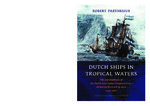Dutch Ships in Tropical Waters
The Development of the Dutch East India Company (VOC) Shipping Network in Asia 1595-1660
Abstract
The end of the 16th century saw Dutch expansion in Asia, as The Dutch East India Company (the VOC) was fast becoming an Asian power, both political and economic. By 1669, the VOC was the richest private company the world had ever seen. This landmark study looks at perhaps the most important tool in the Company' trading - its ships. In order to reconstruct the complete shipping activities of the VOC, the author created a unique database of the ships' movements, including frigates and other, hitherto ingored, smaller vessels. Parthesius's research into the routes and the types of ships in the service of the VOC proves that it was precisely the wide range of types and sizes of vessels that gave the Company the ability to sail - and continue its profitable trade - the year round. Furthermore, it appears that the VOC commanded at least twice the number of ships than earlier historians have ascertained. Combining the best of maritime and social history, this book will change our understanding of the commercial dynamics of the most successful economic organization of the period. Robert Parthesius brengt de scheepvaart en handel van de VOC volledig in kaart. Hij toont aan dat de intra-Aziatische handel sleutel was tot het succes van de maatschappij in de zeventiende eeuw. Met dit boek rekent Robert Parthesius af met het bestaande beeld van de Verenigde Oostindische Compagnie (VOC). Parthesius reconstrueert tot in detail de grootte en de activiteiten van de maatschappij. Hij toont aan dat het aantal schepen onder bevel van de VOC minstens twee keer zo groot was als tot nu toe gedacht. Voorheen is vooral onderzoek gedaan naar het scheepvaartverkeer tussen Azië en Europa, de zogenaamde 'Retourvaart'. Parthesius keek verder dan deze retourvaart en analyseerde de ontwikkeling van het Nederlandse scheepvaartnetwerk in Azië van 1595 tot 1660. Voor deze studie verzamelde hij alle gegevens over VOC-schepen in een database. Zo bracht hij de scheepsroutes van de fregatten maar ook die van de kleinere schepen uitgebreid in kaart. Door de intra-Aziatische handel in de zeventiende eeuw en door de diversiteit aan schepen kon de VOC het hele jaar door varen en streefde zo concurrerende maatschappijen als die van de Portugezen voorbij. Dutch Ships in Tropical Waters is een unieke combinatie van maritiem en sociaal-historisch onderzoek. Dit boek verandert onze kijk op de commerciële dynamiek van de meest succesvolle organisatie in de zeventiende eeuw.
Keywords
archeologie; geschiedenis; scheepvaart; archeology; intra aziatische handel; europese expansie; nederlandse geschiedenis; transport; (spice) trade; azie; voc; history; geography; and auxiliary disciplines; (voc) fleet; Asia; Dutch East India Company; Japan; Maluku Islands; Netherlands; Portuguese people; Race and ethnicity in the United States Census; TaiwanDOI
10.5117/9789053565179ISBN
9789053565179OCN
650591628Publisher
Amsterdam University PressPublisher website
https://www.aup.nl/Publication date and place
2010Series
Amsterdamse Gouden Eeuw Reeks,Classification
History
Archaeology


 Download
Download